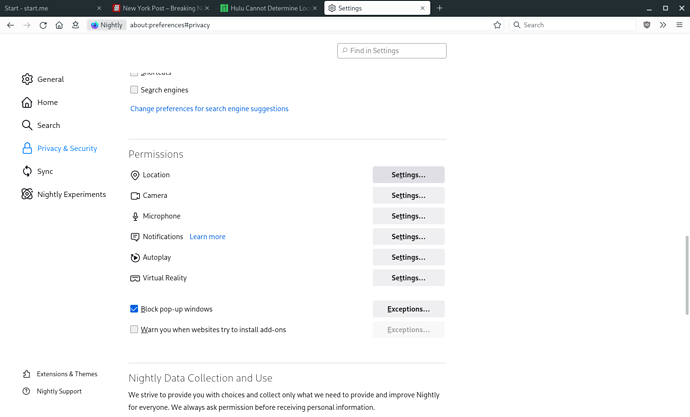Even after giving the site location services on both Chromium and Firefox, it gives an error saying “We are unable to determine your location”. I reinstalled both, and they still error out. I’ve even tried using ElectronPlayer, and that gave me the same result upon giving location services.
If it serves any significance, my inxi -Fazy:
System:
Kernel: 5.16.2-1-MANJARO x86_64 bits: 64 compiler: gcc v: 11.1.0
parameters: BOOT_IMAGE=/boot/vmlinuz-5.16-x86_64
root=UUID=993e126e-a9f3-471a-930b-53026a314373 rw quiet apparmor=1
security=apparmor udev.log_priority=3
Desktop: KDE Plasma 5.23.5 tk: Qt 5.15.2 wm: kwin_x11 vt: 1 dm: SDDM
Distro: Manjaro Linux base: Arch Linux
Machine:
Type: Laptop System: HP product: HP Pavilion Gaming Laptop 15-cx0xxx
v: Type1ProductConfigId serial: <superuser required> Chassis: type: 10
serial: <superuser required>
Mobo: HP model: 8478 v: 70.60 serial: <superuser required> UEFI: Insyde
v: F.26 date: 08/10/2021
CPU:
Info: model: Intel Core i5-8300H bits: 64 type: MT MCP arch: Coffee Lake
family: 6 model-id: 0x9E (158) stepping: 0xA (10) microcode: 0xEA
Topology: cpus: 1x cores: 4 tpc: 2 threads: 8 smt: enabled cache:
L1: 256 KiB desc: d-4x32 KiB; i-4x32 KiB L2: 1024 KiB desc: 4x256 KiB
L3: 8 MiB desc: 1x8 MiB
Speed (MHz): avg: 900 min/max: 800/4000 scaling: driver: intel_pstate
governor: powersave cores: 1: 900 2: 900 3: 900 4: 900 5: 900 6: 900 7: 900
8: 900 bogomips: 36812
Flags: avx avx2 ht lm nx pae sse sse2 sse3 sse4_1 sse4_2 ssse3 vmx
Vulnerabilities:
Type: itlb_multihit status: KVM: VMX disabled
Type: l1tf
mitigation: PTE Inversion; VMX: conditional cache flushes, SMT vulnerable
Type: mds mitigation: Clear CPU buffers; SMT vulnerable
Type: meltdown mitigation: PTI
Type: spec_store_bypass
mitigation: Speculative Store Bypass disabled via prctl
Type: spectre_v1
mitigation: usercopy/swapgs barriers and __user pointer sanitization
Type: spectre_v2 mitigation: Full generic retpoline, IBPB: conditional,
IBRS_FW, STIBP: conditional, RSB filling
Type: srbds mitigation: Microcode
Type: tsx_async_abort status: Not affected
Graphics:
Device-1: Intel CoffeeLake-H GT2 [UHD Graphics 630] vendor: Hewlett-Packard
driver: i915 v: kernel bus-ID: 00:02.0 chip-ID: 8086:3e9b class-ID: 0300
Device-2: NVIDIA GP107M [GeForce GTX 1050 Ti Mobile]
vendor: Hewlett-Packard driver: nvidia v: 495.46
alternate: nouveau,nvidia_drm bus-ID: 01:00.0 chip-ID: 10de:1c8c
class-ID: 0300
Device-3: Logitech HD Pro Webcam C920 type: USB
driver: snd-usb-audio,uvcvideo bus-ID: 1-3.1:8 chip-ID: 046d:082d
class-ID: 0102 serial: <filter>
Device-4: AVerMedia Live Gamer MINI type: USB
driver: snd-usb-audio,uvcvideo bus-ID: 1-3.2:11 chip-ID: 07ca:3311
class-ID: 0102 serial: <filter>
Device-5: Quanta HP Wide Vision HD Camera type: USB driver: uvcvideo
bus-ID: 1-5:7 chip-ID: 0408:5300 class-ID: 0e02 serial: <filter>
Display: x11 server: X.Org 1.21.1.3 compositor: kwin_x11 driver:
loaded: modesetting,nvidia display-ID: :0 screens: 1
Screen-1: 0 s-res: 3840x1080 s-dpi: 101 s-size: 965x271mm (38.0x10.7")
s-diag: 1002mm (39.5")
Monitor-1: HDMI-0 res: 1920x1080 hz: 75 dpi: 102
size: 476x268mm (18.7x10.6") diag: 546mm (21.5")
Monitor-2: eDP-1-1 res: 1920x1080 hz: 60 dpi: 142
size: 344x193mm (13.5x7.6") diag: 394mm (15.5")
OpenGL: renderer: NVIDIA GeForce GTX 1050 Ti/PCIe/SSE2
v: 4.6.0 NVIDIA 495.46 direct render: Yes
Audio:
Device-1: Intel Cannon Lake PCH cAVS vendor: Hewlett-Packard
driver: snd_hda_intel v: kernel alternate: snd_soc_skl,snd_sof_pci_intel_cnl
bus-ID: 00:1f.3 chip-ID: 8086:a348 class-ID: 0403
Device-2: NVIDIA GP107GL High Definition Audio driver: snd_hda_intel
v: kernel bus-ID: 01:00.1 chip-ID: 10de:0fb9 class-ID: 0403
Device-3: Logitech HD Pro Webcam C920 type: USB
driver: snd-usb-audio,uvcvideo bus-ID: 1-3.1:8 chip-ID: 046d:082d
class-ID: 0102 serial: <filter>
Device-4: AVerMedia Live Gamer MINI type: USB
driver: snd-usb-audio,uvcvideo bus-ID: 1-3.2:11 chip-ID: 07ca:3311
class-ID: 0102 serial: <filter>
Device-5: JMTek LLC. USB PnP Audio Device type: USB
driver: hid-generic,snd-usb-audio,usbhid bus-ID: 1-3.3:12 chip-ID: 0c76:161e
class-ID: 0300
Sound Server-1: ALSA v: k5.16.2-1-MANJARO running: yes
Sound Server-2: sndio v: N/A running: no
Sound Server-3: JACK v: 1.9.20 running: no
Sound Server-4: PulseAudio v: 15.0 running: yes
Sound Server-5: PipeWire v: 0.3.43 running: no
Network:
Device-1: Intel Cannon Lake PCH CNVi WiFi driver: iwlwifi v: kernel
bus-ID: 00:14.3 chip-ID: 8086:a370 class-ID: 0280
IF: wlo1 state: down mac: <filter>
Device-2: Realtek RTL8111/8168/8411 PCI Express Gigabit Ethernet
vendor: Hewlett-Packard driver: r8169 v: kernel port: 3000 bus-ID: 04:00.0
chip-ID: 10ec:8168 class-ID: 0200
IF: eno1 state: up speed: 1000 Mbps duplex: full mac: <filter>
IF-ID-1: virbr0 state: down mac: <filter>
Bluetooth:
Device-1: Intel Bluetooth 9460/9560 Jefferson Peak (JfP) type: USB
driver: btusb v: 0.8 bus-ID: 1-14:10 chip-ID: 8087:0aaa class-ID: e001
Report: rfkill ID: hci0 rfk-id: 1 state: down bt-service: enabled,running
rfk-block: hardware: no software: yes address: see --recommends
Drives:
Local Storage: total: 709.84 GiB used: 120.53 GiB (17.0%)
SMART Message: Unable to run smartctl. Root privileges required.
ID-1: /dev/nvme0n1 maj-min: 259:0 vendor: Samsung
model: SSD 970 EVO Plus 250GB size: 232.89 GiB block-size: physical: 512 B
logical: 512 B speed: 31.6 Gb/s lanes: 4 type: SSD serial: <filter>
rev: 2B2QEXM7 temp: 44.9 C scheme: GPT
ID-2: /dev/sda maj-min: 8:0 vendor: Samsung model: SSD 850 PRO 256GB
size: 238.47 GiB block-size: physical: 512 B logical: 512 B speed: 6.0 Gb/s
type: SSD serial: <filter> rev: 4B6Q scheme: GPT
ID-3: /dev/sdb maj-min: 8:16 type: USB vendor: JMicron Tech model: N/A
size: 238.47 GiB block-size: physical: 4096 B logical: 512 B type: N/A
serial: <filter> rev: 0504 scheme: MBR
Partition:
ID-1: / raw-size: 232.59 GiB size: 227.88 GiB (97.98%)
used: 120.53 GiB (52.9%) fs: ext4 dev: /dev/nvme0n1p2 maj-min: 259:2
ID-2: /boot/efi raw-size: 300 MiB size: 299.4 MiB (99.80%)
used: 292 KiB (0.1%) fs: vfat dev: /dev/nvme0n1p1 maj-min: 259:1
Swap:
Alert: No swap data was found.
Sensors:
System Temperatures: cpu: 57.0 C pch: 55.0 C mobo: 27.8 C gpu: nvidia
temp: 49 C
Fan Speeds (RPM): N/A
Info:
Processes: 310 Uptime: 6m wakeups: 1 Memory: 15.52 GiB
used: 3.49 GiB (22.5%) Init: systemd v: 250 tool: systemctl Compilers:
gcc: 11.1.0 clang: 13.0.0 Packages: 1554 pacman: 1521 lib: 424 flatpak: 23
snap: 10 Shell: Zsh v: 5.8 default: Bash v: 5.1.16 running-in: yakuake
inxi: 3.3.12
